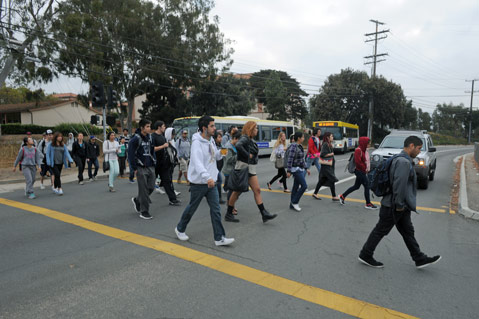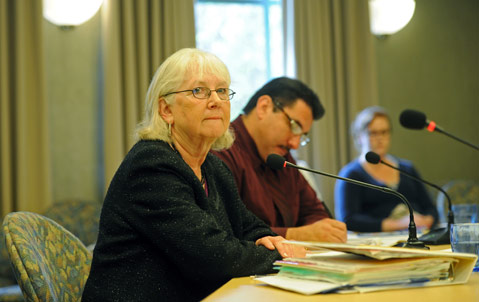Bus Line to Mission Gets Reprieve
But Pension Dispute Puts MTD $4.6 Million Behind Eight Ball

Metropolitan Transit District executive Sherrie Fisher doesn’t talk about the proverbial “elephant in the room.” Instead, she talks about the “elephant” being “at the table” and weighing in at $4.6 million. For Fisher, that’s the amount of federal money that normally comes to Santa Barbara every year courtesy of the Department of Transportation, roughly 25 percent of what MTD spends annually to keep the buses running.
About four weeks ago, however, an indefinite hold was placed on that money because of a dispute between MTD and the Teamsters union over new pension rules requiring new district employees to pay a greater amount into their retirement funds. Fisher said the district can make up the shortfall for a while by dipping into funds allocated for long-term capital needs. But if this conflict is not resolved by the summer, she said, massive cuts in service will be required. This was only alluded to in passing during the Tuesday-morning MTD board meeting but not discussed or dissected in any detail. The focus, instead, was whether to eliminate bus service — Line 22 — from downtown to the Mission, the Museum of Natural History, and the newly refurbished El Encanto Hotel.
Fisher made a strong case to pull the plug on Line 22, citing chronically low ridership numbers. A typical bus route averages 25 passengers an hour; by contrast, the Mission bus line averages 14. That translates, Fisher said, into only five bodies on the bus “going up the hill” on any given trip. Although El Encanto just spent $2,000 to buy bus passes to give out to its 200 new employees, Fisher said Line 22 has experienced no bump in ridership. The district could save about $125,000 a year, Fisher told her board, and use the proceeds to help increase service on lines where bus-service demand so routinely outpaces supply that the district reported 13,000 instances last year in which would-be riders were left “stranded” because there was not enough room on the buses. The demand is such for lines 14 and 25 — the two routes connecting UCSB and City College — that even without the cannibalized proceeds of Line 22, Fisher and the district have proposed adding a $100,000 bump in bus services.

When it came time to actually do away with Line 22, the board could not bring itself to do the deed. As Steve Newman, a boardmember of the Riviera Association, noted, the streetcar was first extended to the Mission and the Riviera 100 years ago in 1913. It would be a cruel centennial celebration, he argued, to kill it now. “MTD should consider its obligation to provide service to all parts of the city, not just the profitable ones,” he stated. El Encanto’s general manager also spoke against the contemplated cut, suggesting that if MTD shifted the hours of service — so that workers could arrive at El Encanto earlier in the day and leave later in the evening — ridership would rise accordingly. Boardmember Dave Tabor commented, “Losing that line would be like losing one of our limbs.” And more than one boardmember called it “iconic.” After the meeting, so too did Fisher. As a bus driver starting out with MTD in 1974 — the first woman driver the district employed — Fisher recalled it was one of the first routes she was assigned. But even then, she recalled, ridership was significantly lower than other routes.
In the face of such opposition, the board balked. Rather than cut, they pledged to revisit the issue in six months. Maybe by then, they reckoned, El Encanto’s workforce will have discovered the bus. In the interim, Fisher was urged to meet with all likely stakeholders — El Encanto, the Museum of Natural History, Mission Santa Barbara, and the Botanic Garden — to enlist their support. Senior boardmember Dave Davis pointed out pessimistically that Fisher had done just that over the past two years without appreciable effect. Partially in jest, Fisher responded that she’d “lock all the doors” when she met them this next time.
If the $4.6 million pension dispute qualifies as the “elephant in the room,” then the multitude of City College riders collectively constitute the equally proverbial “800-pound gorilla.” Of the 8 million bus rides provided by MTD a year, 1.2 million are taken by City College students. (UCSB students and employees account for another 800,000.) “That two million students is a huge success story,” Fisher said, alluding to the sizable number of car trips not taken, parking spaces not demanded, and smog not generated. “But it’s also overwhelming our system.”
Beyond raw demand for service and attendant costs, City College students bring an additional wrinkle. With their student fees, every student gets a “free” bus pass, good for an entire semester. Currently, they pay $24 — as part of their enrollment — for those passes. According to Fisher, that translates to 93 cents per trip. By contrast, the very lowest a non–City College student can pay is $1.15 per trip. To bridge that gap, SBCC students would have to vote to increase their fees to $37. When MTD officials first broached that prospect with new President Lori Gaskin, she reportedly felt blindsided. Students were already getting hammered by fee increases, she objected. And besides, Gaskin hoped to ask students to approve a similar fee increase to help defray campus parking expenses.
It turns out state law won’t allow community college students to “tax” themselves more than $70 a semester for parking and transit services. To get past this bottleneck, a change in state law will have to be sought. How long that might take is anyone’s guess. In the meantime, Fisher said Gaskin has agreed to a $6 increase in bus pass fees — from $24 to $30 — but students would have to ratify that in 2014. The last such vote took place in 2009, when City College students approved a 40 percent increase in bus fees.
[CLARIFICATION: City College President Lori Gaskin stressed that the ultimate decision for ratifying any fee increase to cover the costs of transit lay with the students, but confirmed that she was both “appreciative” and “supportive” of the $6 proposal put forth by MTD. Initially, Gaskin said, MTD had approached her with a much bigger increase — from $24 to $43 — which she opposed. At that time, she said, students had been hit with tuition increases of 130 percent and text book costs were “going off the charts,” and that a $43 transit was simply too much. She said she understands MTD’s need for some kind of a fee increase, adding of the $6 proposal, “I could support it at this level.” The soonest the students could vote on such an increase, however, is 2014.]
All that, however, is chump change compared to the high stakes involved in the showdown with the Teamsters over retirement contributions. According to Fisher, the State Legislature passed AB 340 — the Pension Reform Act — last year, requiring that public employees pay up to 50 percent of the “normal” pension contribution out of their own pockets. Fisher noted that “normal” is not defined anywhere in the legislation, but that the monetary value involved could be quite large. She stressed this new law will only affect employees hired after New Year’s and will not affect existing employees retroactively. But in keeping with the new law, Fisher said, she sought to include this language in the new contract MTD has been negotiating with the Teamsters for more than a year. The union has objected, arguing that such concessions have to be hammered out via the collective bargaining process, not imposed unilaterally.
As Fisher pointed out, it’s not a controversy unique to Santa Barbara; communities throughout the entire state find themselves in the same boat. Most recently, an East Bay Democrat in the State Assembly introduced a bill that would exempt public transit workers from the Pension Reform Act. But in the meantime, the Teamsters took its case to the Department of Labor, which, in turn, froze the federal operational funding that otherwise would have gone to the MTD.
For MTD, that’s a $4.6 million question mark over the fate of an operation that costs $22 million a year to keep the buses full. If the dispute is not resolved by summer, Fisher said, the least of anyone’s worry will be the fate of Line 22. Fisher expressed confidence, however, that funding would be restored. “Just call me Miss Pollyanna,” she said. The alternative, she said, was too unthinkable.



